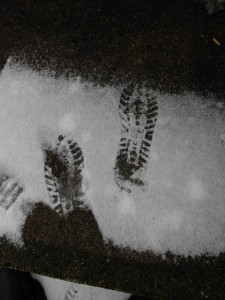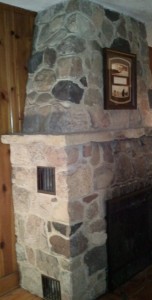We widows like to tell ourselves we’re strong and aren’t afraid to live alone. But during a night when we can’t sleep, fear creeps around the edges of our minds, and we wish our men were still lying next to us. Not that they would have always known what to do, but two heads are usually better than one.
Last night as I was putting my head on the pillow, I heard an unfamiliar thump coming from downstairs. It was almost 1:00 am, too late for company, and Jack had been asleep in his doggie bed for an hour before I’d gone upstairs.
Unwilling to let myself get spooked by what might be nothing, I prayed, and God quickly reminded me he doesn’t ever try to scare us and can protect us from fright. I decided I’d abandon myself to his care, no matter what the noise was, and shortly thereafter fell asleep.
This morning as Jack and I were returning from a walk, we decided to use the front door instead of our usual back, and I got a shocker. In an inch of snow from yesterday, there were mysterious footprints walking up my front steps. They gave me a start, and I froze. Had someone tried to get into the house last night? Was that what I’d heard?
As I studied the prints, I noticed they had an interesting grid pattern. And then it hit me. The mysterious footprints were mine, steps made last night after walking Jack. And suddenly I felt foolish.
But this is how it goes with widows. As we practice living alone, we’re breaking new ground we never wanted to cover, and runaway thinking is one blip away from common sense. God knows this and has prepared a slew of promises for our use when panic hits. Sometimes he even lays the groundwork ahead of time for nights like last night.
For example, yesterday morning Louisa shared a valuable verse with me from Isaiah: “You [Lord] will keep in perfect peace all who trust in you, all whose thoughts are fixed on you!” (26:3) Naturally, then, those same words rushed into my head when I was feeling vulnerable.
Our God is practical. He promises to deliver us when we need it, and when we’re nervous, he guarantees he’ll calm us if we ask him. That’s true for everybody, not just widows. He doesn’t want any of us to live on edge but does understand how emotions can get in the way of sound reasoning. It’s comforting to know he’s always got a battle plan in order and wants to see us victorious over nervousness and fear, whenever it strikes.
As for that strange noise during the night? After a thorough house inspection, I’ve decided I’ll never know. Maybe it was God simply giving me one more opportunity to trust him.
“If you make the Lord your refuge, if you make the Most High your shelter, no evil will conquer you.” (Psalm 91:9-10a)





